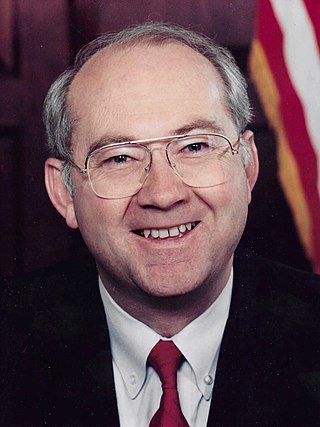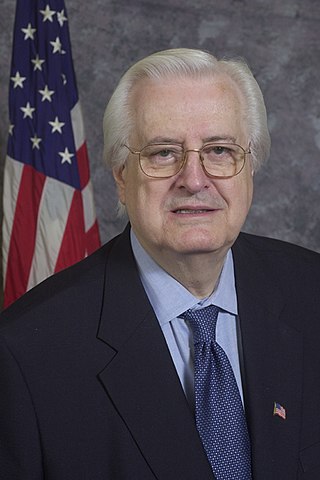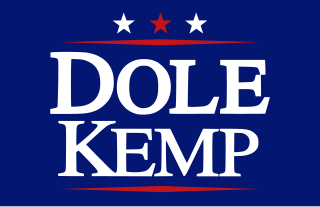Related Research Articles

The 1996 United States presidential election was the 53rd quadrennial presidential election, held on Tuesday, November 5, 1996. Incumbent Democratic President Bill Clinton defeated former Senate Majority Leader Bob Dole, the Republican nominee, and Ross Perot, the Reform Party nominee and 1992 Independent presidential candidate.

The 1992 United States presidential election was the 52nd quadrennial presidential election, held on Tuesday, November 3, 1992. Democratic Governor Bill Clinton of Arkansas defeated incumbent Republican President George H. W. Bush and independent businessman Ross Perot of Texas. The election marked the end of a period of Republican dominance in American presidential politics that began in 1968,, and also marked the end of 12 years of Republican rule of the White House, as well as the end of the Greatest Generation's 32-year American rule and the beginning of the baby boomers' 28-year dominance until 2020. It was the last time the incumbent president failed to win a second term until 2020, when Donald Trump lost the election to Joe Biden; it was the first such occurrence since 1980.

Robert Joseph "Bob" Dole was an American politician and attorney who represented Kansas in the United States Senate from 1969 to 1996. He was the Republican Leader of the Senate during the final 11 years of his tenure, including three non-consecutive years as Senate Majority Leader. Prior to his 27 years in the Senate, he served in the United States House of Representatives from 1961 to 1969. Dole was also the Republican presidential nominee in the 1996 election and the vice presidential nominee in the 1976 election.

Jesse Alexander Helms Jr. was an American politician. A leader in the conservative movement, he served as a senator from North Carolina from 1973 to 2003. As chairman of the Senate Foreign Relations Committee from 1995 to 2001, he had a major voice in foreign policy. Helms helped organize and fund the conservative resurgence in the 1970s, focusing on Ronald Reagan's quest for the White House as well as helping many local and regional candidates.

William Harrison Frist is an American physician, businessman, conservationist and policymaker who served as a United States Senator from Tennessee from 1995 to 2007. A member of the Republican Party, he also served as Senate Majority Leader from 2003 to 2007. Born in Nashville, Tennessee, Frist studied government and health care policy at Princeton University and earned a Doctor of Medicine degree from Harvard Medical School. He trained as a cardiothoracic transplant surgeon at Massachusetts General Hospital and Stanford University School of Medicine, and later founded the Vanderbilt Transplant Center. In 1994, he defeated incumbent Democratic Senator Jim Sasser. He pledged to only serve two terms.

William Philip Gramm is an American economist and politician who represented Texas in both chambers of Congress. Though he began his political career as a Democrat, Gramm switched to the Republican Party in 1983. Gramm was an unsuccessful candidate in the 1996 Republican Party presidential primaries against eventual nominee Bob Dole.

James Merrill Jeffords was an American lawyer and politician who served as a U.S. senator from Vermont. Sworn into the Senate in 1989, he served as a Republican until 2001, when he left the party to become an independent and began caucusing with the Democrats. Jeffords retired from the Senate in 2007. Prior to serving in the Senate, he served as the U.S. representative for Vermont's at-large congressional district from 1975 to 1989.

Henry John Hyde was an American politician who served as a Republican member of the United States House of Representatives from 1975 to 2007, representing the 6th District of Illinois, an area of Chicago's northwestern suburbs. He was Chairman of the Judiciary Committee from 1995 to 2001, and the House International Relations Committee from 2001 to 2007. He is most famous for writing the Hyde Amendment, as a vocal opponent of abortion.

Howard Jay Phillips was an American politician and activist. A political conservative, Phillips was a United States presidential candidate who served as the chairman of The Conservative Caucus, a conservative public policy advocacy group which he founded in 1974. Phillips was a founding member of the U.S. Taxpayers Party, which later became known as the Constitution Party.

Randall Allen Terry is an American activist and political candidate. Terry founded the anti-abortion organization Operation Rescue. Beginning in 1987, the group became particularly prominent for blockading the entrances to abortion clinics; Terry led the group until 1991. He has been arrested more than 40 times, including for violating a no-trespass order from the University of Notre Dame in order to protest against a visit by President Barack Obama.

The 1992 Democratic National Convention nominated Governor Bill Clinton of Arkansas for president and Senator Al Gore from Tennessee for vice president; Clinton announced Gore as his running-mate on July 9, 1992. The convention was held at Madison Square Garden in New York City, New York from July 13 to July 16, 1992. The Clinton-Gore ticket then faced and defeated their Republican opponents, President George H. W. Bush and Vice President Dan Quayle as well as the independent ticket of Ross Perot and James Stockdale in the 1992 presidential election.

Richard Henry Carmona is an American physician, nurse, police officer, public health administrator, and politician. He was a vice admiral in the Public Health Service Commissioned Corps and served as the seventeenth Surgeon General of the United States. Appointed by President George W. Bush in 2002, Carmona left office at the end of July 2006 upon the expiration of his term. After leaving office, Carmona was highly critical of the Bush administration for suppressing scientific findings which conflicted with the administration's ideological agenda.

John Lester Hubbard Chafee was an American politician and officer in the United States Marine Corps. A member of the Republican Party, he served as the 66th Governor of Rhode Island, as the Secretary of the Navy, and as a United States Senator.

The 1996 United States Senate elections were held on November 5, with the 33 seats of Class 2 contested in regular elections. Special elections were also held to fill vacancies. They coincided with the presidential election of the same year, in which Democrat Bill Clinton was re-elected president.

Atul Atmaram Gawande is an American surgeon, writer, and public health researcher. He practices general and endocrine surgery at Brigham and Women's Hospital in Boston, Massachusetts. He is a professor in the Department of Health Policy and Management at the Harvard T.H. Chan School of Public Health and the Samuel O. Thier Professor of Surgery at Harvard Medical School. In public health, he is executive director of Ariadne Labs, a joint center for health systems innovation, and chairman of Lifebox, a nonprofit that works on reducing deaths in surgery globally. On June 20, 2018, Gawande was named the CEO of healthcare venture Haven, owned by Amazon, Berkshire Hathaway, and JP Morgan Chase and stepped down as CEO in May 2020, remaining as executive chairman while the organization sought a new CEO.

The 2006 United States Senate election in New York was held on November 7, 2006. Incumbent Democratic U.S. Senator Hillary Clinton won re-election to a second term in office, by a more than two-to-one margin. Clinton was challenged by Republican John Spencer, the former mayor of Yonkers. Longtime political activist Howie Hawkins of the Green Party also ran a third-party campaign.

James Albert Smith Leach is an American academic and former politician. He served as ninth Chair of the National Endowment for the Humanities from 2009 to 2013 and was a member of the U.S. House of Representatives from Iowa (1977–2007).

From January 29 to June 4, 1996, voters of the Republican Party chose its nominee for president in the 1996 United States presidential election. Senator Bob Dole of Kansas, the former Senate majority leader, was selected as the nominee through a series of primary elections and caucuses culminating in the 1996 Republican National Convention held from August 12 to 15, 1996, in San Diego, California; Dole resigned from the Senate in June 1996 once he became the presumptive nominee to concentrate on his presidential campaign.

The 1974 United States Senate election in Kansas took place on November 5, 1974. Incumbent Republican U.S. Senator Bob Dole was narrowly re-elected to a second term in office.

The 1996 presidential campaign of Bob Dole began when Republican Senator and Senate Majority Leader Bob Dole formally announced his candidacy for Republican Party nomination in 1995. After beating other candidates in the primaries, he became the Republican nominee, with his opponent being Democratic incumbent President Bill Clinton in the 1996 presidential election. Dole conceded defeat in the race in a telephone call to Clinton on November 5, 1996.
References
- ↑ Tennessean obituary, October 5, 2022
- ↑ "Clinton Presses Surgeon General Battle (Published 1995)". The New York Times . Archived from the original on 2021-12-06.
- ↑ "Gramm Vows Fight on Surgeon General (Published 1995)". The New York Times . Archived from the original on 2021-12-06.
- ↑ Clinton's Choice for Top Doctor Is Rebuffed by a Vote in Senate